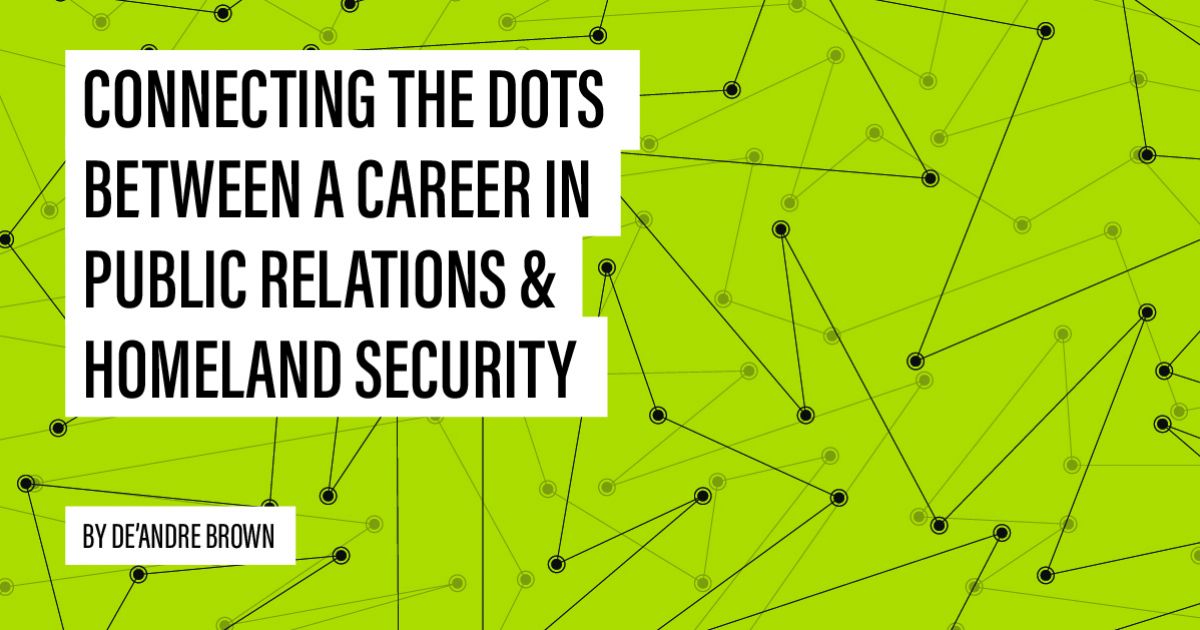When it comes to thinking about their future goals, most kids are told “the sky’s the limit” by their parents, family, and teachers. However, I was taught that because of the color of my skin, I needed to exceed the limit to stand out and be successful. This drive has carried me through my professional and academic career and continues to guide me today.
I’ve worked hard to achieve my professional goals, although my academic and career paths haven’t been linear. I have a master’s degree in homeland security and a bachelor’s degree in public relations and marketing—two topics that don’t seem to have a clear connection. But this combination has been invaluable to me as I’ve progressed in my career and serves me well as an account manager at LMD. In this role, I oversee projects for our Prince George’s County government clients and lead our public relations practice.
So, as the song goes, how did I get here?
One Road Leads to the Next
I studied PR and marketing as an undergraduate at Eastern Michigan University because I was interested in how human behavior is influenced by marketing and communication. In addition to learning about audience segmentation, marketing strategy, and advertising, I also learned about crisis management and communication.
These topics piqued my interest because they’re fast-paced and truly test an organization’s strength and leadership. The fact that some organizations fail due to lack of transparency while others thrive because they send the right messages to their audiences fascinated me.
In my honors fellowship in crisis communications, I studied the Exxon Valdez oil spill, the BP Deepwater Horizon disaster, the Domino’s Pizza social media crisis, and the 2013 Target Corporation data breach. These events are memorable in large part because they serve as great case studies on what organizations should not do during a crisis. I learned that to come out of a crisis successfully, organizations must:
- Communicate to the public: An organization should be first to inform customers about the crisis regardless of what information is known or unknown.
- Be ready to respond to customers: Organizations in crisis should bring in extra personnel and outside counsel to handle customer concerns; otherwise, they risk losing the public’s trust.
- Rebuild trust through transparency: The best way to rebuild trust is to be transparent, apologize, demonstrate how you’re fixing the problem, and provide victims with resources for recovery.
The Next Step on My Professional Path
When I finished my fellowship, I searched for graduate programs in crisis management and communications—only to learn that no such program exists. However, I found the homeland security program at Penn State, which covers homeland security issues in both the government and private sectors, and focuses on legislation and policy, strategy, planning, administration, and interaction across the homeland security enterprise.
The flexibility of the program allowed me to combine homeland security and public relations by specializing in two areas of study:
- Crisis communication: This is an understudied area of homeland security when it comes to responding to terrorism and natural disaster response. I wanted to understand how communications can influence the public during a crisis and how different media can get messages to the public to help people access important resources, protect them from danger, and lessen the impact of the crisis.
- Criminology: I’ve been intrigued by radicalism and terrorist behavior since the 9/11 attacks. Terrorist groups like Al Qaeda, the Islamic State in Iraq, and al-Shabaab attract people to swear allegiance and commit attacks in their name. I wanted to understand the social implications and impact of these criminal groups—who commits these crimes, why they commit them, and how to prevent them.
My Passion and the Road Ahead
At LMD, I continue to expand my skills and knowledge at the intersection of communications and homeland security. For example, I’ve had the opportunity to serve as a subject matter expert for both PR and homeland security clients and contribute to projects like the U.S. Department of Homeland Security’s “If You See Something, Say Something®” campaign.
Homeland security as a discipline and an area of study is still in its infancy in the U.S.—there’s still much to learn. My next area of interest is exploring how we can prevent crises such as terrorist attacks by educating people on how to report suspicious behavior and help people who are at risk of being radicalized. At LMD, I really do feel that the sky is the limit to pursue these two passions—and hopefully use my expertise to help prevent future crises.
Need help with public relations strategy? Contact LMD.
